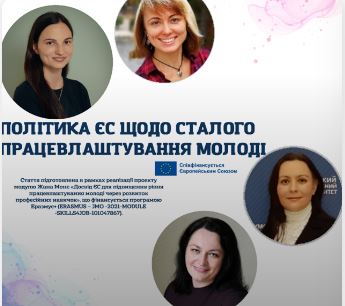The author’s team of associate professors of the Department of Accounting and Taxation Yuliya Serpeninova and Natalia Vynnychenko, as well as associate professors of the Department of International Economic Relations Oksana Zamora and Tetyana Shcherbyna and student Maryna Horodetska, published an article in the scientific journal Visnyk of Sumy State University, economy series.
The article was prepared within the framework of Jean Monnet’s module “EU experience for increasing the level of youth employment through the development of professional skills”, financed by the Erasmus+ program (ERASMUS – JMO -2021-MODULE -SKILLS4JOB-101047867).
The article systematizes and investigates the current state and causes of youth unemployment in EU countries. The main factors influencing this indicator are the following: lack of vacancies for inexperienced youth, natural employee turnover, economic downturn, etc. The normative and legal support of youth employment policy was considered, in particular employment policy aimed at post-pandemic recovery. The main regulatory acts of youth employment policy in the EU are defined as European Pact for Youth, Resolution “Youth Employment Crisis: A Call to Action”, “Framework Action Program on Youth Employment” and others. European programs and initiatives aimed at reducing youth unemployment, as well as improving education and labour mobility are analysed. The main European programs and initiatives are defined as NextGenerationEU, the Strategy “Youth – investing and providing opportunities”, the “Youth opportunities” initiative, “Involvement of youth in employment” and others. They include creating more opportunities for young people in education and employment, improving access and full participation in society, developing skills relevant to the labour market, supporting first work experience and workplace learning, etc. It is emphasized the need to stimulate the economic growth of the EU member states, focusing on the youth segment, implementing employment support programs adapted to the current situation in the world.
Funded by the European Union. Views and opinions expressed are however those of the author(s) only and do not necessarily reflect those of the European Union or the European Education and Culture Executive Agency (EACEA). Neither the European Union nor EACEA can be held responsible for them.

